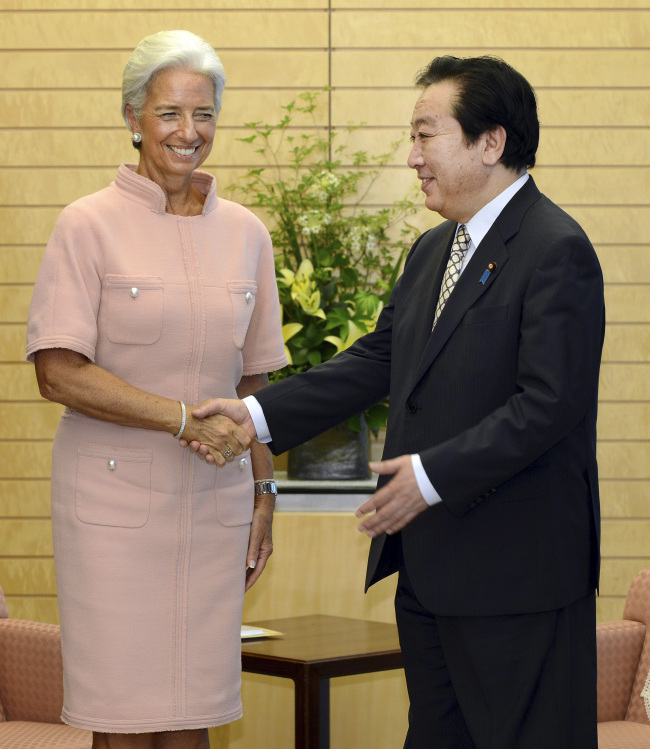The International Monetary Fund will reduce its estimate for global growth this year on weakness in investment, jobs and manufacturing in Europe, the U.S., Brazil, India and China, Managing Director Christine Lagarde said.
“The global growth outlook will be somewhat less than we anticipated just three months ago,” Lagarde said in a speech in Tokyo Friday. “And even that lower projection will depend on the right policy actions being taken.” The new outlook will be announced in 10 days, after an April estimate of 3.5 percent, she said.
The “key emerging markets” of Brazil, China and India are showing signs of slowdown, Lagarde said. Those three countries along with Russia will comprise more than 20 percent of the world economy this year, according to IMF data.
 |
IMF Managing Director Christine Lagarde (left) is welcomed by Japanese Prime Minister Yoshihiko Noda during their talks at Noda’s official residence in Tokyo on Friday. (AP-Yonhap News) |
“Over the past few months, the outlook has regrettably become more worrisome,” Lagarde said. “Many indicators of economic activity ― investment, employment, manufacturing ― have deteriorated. And not just in Europe or the United States.”
The IMF has already lowered its U.S. growth estimate to 2 percent from April’s 2.1 percent.
European Union leaders agreed at a June 28-29 meeting to loosen bailout rules, lay the foundations for a banking union and break the link between sovereign and banking debt through the direct recapitalization of lenders.
The summit was “of more significance” than past attempts to stem the crisis, Lagarde told Bloomberg contributor Judy Woodruff in a July 3 televised interview.
“They need to move towards fiscal union as well,” Lagarde said then. “But they’re heading in a new direction together and that’s a clear sign that things are changing.”
The MSCI Asia Pacific Index was 0.6 percent lower at 3:00 p.m. in Tokyo on concern Thursday’s central bank easing won’t be enough to boost growth.
As Greece struggles with elevated unemployment and a recession, the nation has said that it wants to renegotiate its bailout, something Lagarde said she was not in the mood for, in a July 3 interview with CNBC. Officials from the IMF, ECB and the European Commission are assessing the country’s progress in implementing the terms of a second international rescue package.
Yen Concerns
Japanese Prime Minister Yoshihiko Noda told Lagarde that sustained gains in the yen because of the euro region’s crisis are damaging his country’s economy, according to a statement released by his office Friday.
“The euro zone crisis is the most important problem facing the global economy at present,” Noda said in the statement. The strength of the yen “does not reflect the real state of Japan’s economy,” he said.
Asia’s second-biggest economy needs to sustain a recovery from last year’s earthquake and tsunami without enlarging a public debt burden that is already the world’s biggest. Gains by the yen crimp exporters’ sales and profits, dragging on the nation’s growth.
The gains in the currency and impact on exports from slowing European growth are “two risks of primary concern” for Japan, Lagarde said. She praised the passage of Noda’s bill to double the consumption tax through the lower house of parliament last month as a “very positive step,” adding that it was “critical” for it to be implemented. The legislation has yet to be voted on in the upper house.
(Bloomberg)








